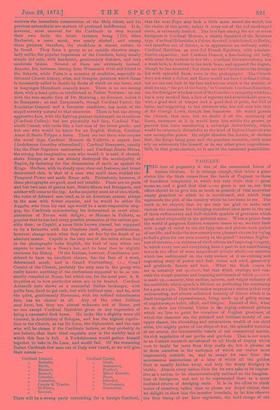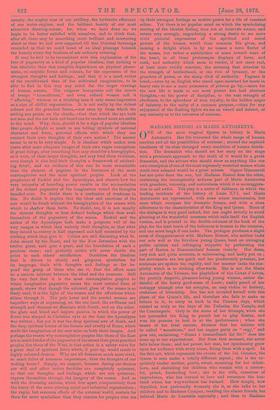PAGEANT.
THE love of pageantry is one of the commonest forms of human idealism. It is strange enough, that when a great visitor like the Shah comes from the lands of Pageant to those of humdrum complexity in which but very little that is great seems so, and a good deal that seems great is not so, our first effort should be to give him as much as possible of that somewhat empty grandeur to which he is accustomed, and which least represents the pith of the country which he has come to see. The truth is, we suspect, that we are only too glad to make such visitors the occasions for indulging ourselves once more in the use of those rudimentary and half-childish symbols of greatness which speak most eloquently to the pictorial sense. When a prince from the world of gorgeous Eastern romance comes to us, we turn back with a sigh of relief to the old fairy-tale and picture-book period of our life, and make the new corner a very pleasant excuse for trying to find a place for our own country in the grand "Arabian Nights" sort of universe,—a universe of vivid colours and imposing imagery, in which every one and everything have a part to act contributing towards the effect of some magnificent artistic whole,—a universe which has emblazoned on the very surface of it an exciting and engrossing story of power and fear, riches and need, generosity and gratitude, favour and love. What the Shah comes to see is certainly not spectacle, but that which overlays and con- ceals the simple passions and imposing sentiments of which spectacle is made up,—namely, that endless, minute, and vulgar industry of the multitude which spends a lifetime on perfecting the machinery for a pen or a pin. That which makes us great as a nation is that very uninteresting, but almost unlimited tenacity of labour which is in itself incapable of expressiveness, being made up of gritty atoms of unpicturesque habit, effort, and fatigue. Instead of this, what we do show our Oriental Visitor is the highly-coloured picture which we love to paint for ourselves of English greatness, of which the elements are the polished and brilliant society of our upper classes, the abounding and ostentatious wealth of our chief cities, the mighty power of our ships-of-war, the splendid material of our armies, the innumerable vessels of our commercial marine, the rich vegetation of our parks and gardens. That is not much to an Eastern monarch accustomed to all kinds of display which seem to imply far more than they really do, but it pleases us to dress ourselves in the costumes of which our visitor most impressively reminds us, and to escape for once from the monotonous associations of a hive of which all the golden fruit is usually hidden away, and only the weary drudgery is visible. Almost every nation likes for its own sake to be impres- sive as a nation, to be characteristically outlined on the imagina- tion of foreigners, and not to be represented there as a mere confused swarm of drudging units. It is in the effort to think better of ourselves, rather than to please our Royal visitor, that we delight to show him the monster ironclads, to let him observe the firm tramp of our Line regiments, the bold charge of our
cavalry, the mighty roar of our artillery, the hydraulic efficiency of our water-engines, and the brilliant beauty of our most attractive drawing-rooms; for, when we have done so, we begin to be better satisfied with ourselves, and to think that, after all, there may be something more brilliant and interesting about us than we had ever suspected till this Oriental Sovereign reminded us that we could boast of an ideal plumage beneath the homely every-day feathers of our ordinary covering.
It may be said to be inconsistent with this explanation of the love of pageantry as a kind of popular idealism, that nothing is leas idealistic than this complete dependence on physical pheno- mena, on majestic forms and colours, for the expression of the strongest thoughts and feelings ; and that it is a mark rather of the uncultivated than of the cultivated imagination, to be able to find in this way any relief for the larger cravings of human nature. The vulgarer bourgeoisie call the march of troops " toomultuous," and even refined women call it " affecting," whereas to a thinking man it only seems impressive as a sign of skilful organisation. It is not really by the richest colours and the grandest forms,—not even by those which the setting sun paints on the clouds,—that that which the eye hath not seen and the ear hath not heard can be rendered more accessible to the mind. Why, then, should it be a sign of popular idealism that people delight so much to see telling symbols of national character and force, pictorial effects with which they can connect their own thoughts of their own nation ? The answer seems to us to be very simple. It is idealism which makes men yearn after more adequate images of their own vague conceptions of great things, after something that may stand for a hieroglyphic, as it were, of their larger thoughts, and may lend them vividness, even though it also lend their thoughts a framework of mislead- ing detail; and no evidence of this can be more remarkable than the element of pageant in the literature of the most contemplative and the most spiritual peoples. Look at the prophecies of Ezekiel and the Apocalypse, and observe how the very intensity of brooding power results in the accumulation of the richest pageantry of the imagination round the thoughts brooded over. No doubt there is a confession of weakness in this. No doubt it implies that the ideas and emotions of the seer would be dumb without the hieroglyphics of the senses with which to shadow them forth. No doubt, too, it is not usually the clearest thoughts or best defined feelings which thus avail themselves of the pageantry of the senses. Ezekiel and the author of the Apocalypse both make a gorgeous veil of the very images in which they embody their thoughts, so that what they intend to convey is half expressed and half concealed by the clothing which they give it. Critics are still discussing what St. John meant by the Beast, and by the New Jerusalem with the twelve gates, each gate a pearl, and the foundation of each a precious stone ; and probably critics will never decide the point to each others' satisfaction. Doubtless the idealism that is driven to cloudy and gorgeous symbolism for its language, deals with thoughts and feelings so far be- yond the grasp of those who use it, that the effect must be a curious mixture between the ideal and the sensuous. Still the very fact that it is the most contemplative peoples to whom imaginative pageantry seems the most natural form of speech, shows that though the coloured glass of the senses is so freely used, it is the light of the reason and the affections which shines through it. The pale horse and the scarlet woman are imperfect ways of expressing, on the one hand, the swiftness and strength and dimness we gesociate with Death, and on the other, the glare and blood and impure passion in which the power of Rome was steeped to Christian eyes at the time the Apocalypse was written ; but yet it was the deep spiritual awe of death, and the deep spiritual horror of the licence and cruelty of Rome, which made the imagination of the seer seize on both these images. And perhaps the reason why contemplative peoples like those of the East are so much fonder of the pageantry of the senses than great practical peoples like those of the West, is that action is a safety-valve for a great deal of spiritual force which, if pent up, would result in highly coloured dreams. Why are all dreams so much more vivid, so much fuller of sensuous impressions, than the thoughts of our waking hours ? Simply, we suspect, because during our dreams our will and other active faculties are completely quiescent, so that our thoughts and feelings, which are not quiescent, express themselves through the imagery of the senses. And so with the dreaming nations, which live apart comparatively from the hurry of the more stirring social and industrial organisations ; the vague, but sensuous effects of the external world, contain for them far more symbolism than they contain for peoples who use
up their strongest feelings as motive-power for a life of constant action. Yet there is no popular mind on which the symbolising craving of the idealist feeling does not at intervals return, and return very strongly, engendering a strong desire to see more vivid pictorial expressions of the spiritual and moral powers of the human world than common life gives, and causing a delight which is by no means a mere flutter of the senses, but rather a satisfaction of some inward want of the heart, in all those picturesque displays of force, and rank, and authority which seem to render, if not more real, at least more vividly coacrete, the meaning that attaches to the strength of brotherhood, or the vice of tyranny, or the grandeur of power, or the sharp click of authority. Pageant is loved,—even by us English who stand open-mouthed for hours in heavy rain to see a mere procession of princes go by,—more for the new life it lends to ow most potent but half abstract thoughts,—to the power of discipline, to the vast strength of obedience, to the splendour of true royalty, to the hidden magic of industry, to the unity of a common purpose,—than for any enjoyment of the flashing lights we see on sword and helmet, or any curiosity as to the resources of costume.



































 Previous page
Previous page